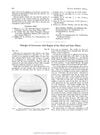 67 citations,
June 2018 in “Engineering in Life Sciences”
67 citations,
June 2018 in “Engineering in Life Sciences” Plant cell culture is a promising method for creating sustainable and high-quality cosmetic ingredients.
 5 citations,
January 2017 in “Acta Endocrinologica”
5 citations,
January 2017 in “Acta Endocrinologica” High androgen levels in postmenopausal women may suggest an ovarian tumor, and removing it can improve heart and metabolic health.
[object Object]  92 citations,
December 2012 in “Current opinion in genetics & development”
92 citations,
December 2012 in “Current opinion in genetics & development” Turing patterns are now recognized as important in developmental biology.
 January 2024 in “Regenerative Biomaterials”
January 2024 in “Regenerative Biomaterials” Metal organic frameworks-based scaffolds show promise for tissue repair due to their unique properties.
 63 citations,
January 1992 in “Experimental Neurology”
63 citations,
January 1992 in “Experimental Neurology” Chickens exposed to loud noise can quickly regain hearing mostly due to repair of the tectorial membrane, not just hair cell regeneration.
20 citations,
October 2021 in “Applied materials today” A new microneedle patch and yellow light therapy significantly promote hair regrowth.
 8 citations,
April 1999 in “Dermatologic Clinics”
8 citations,
April 1999 in “Dermatologic Clinics” Using microscopes in hair transplants reduces follicle damage.
 2 citations,
January 2012 in “Journal of metabolic syndrome”
2 citations,
January 2012 in “Journal of metabolic syndrome” The document concludes that hirsutism can be managed with various treatments tailored to the individual, potentially improving quality of life.

Curry leaves offer health benefits and can be used safely in various forms for digestion, diabetes control, and hair growth.
 18 citations,
August 2019 in “Drug Development and Industrial Pharmacy”
18 citations,
August 2019 in “Drug Development and Industrial Pharmacy” Quercetin-loaded nanoparticles can penetrate skin, minimize hair loss, and promote hair regrowth, showing slightly better results than a marketed product.
 40 citations,
March 2017 in “The journal of investigative dermatology/Journal of investigative dermatology”
40 citations,
March 2017 in “The journal of investigative dermatology/Journal of investigative dermatology” Growing hair follicles have high mitochondrial activity and ROS in specific regions, aiding hair formation.
December 2021 in “Asian journal of pharmaceutical and clinical research” The homemade hair oil made from natural ingredients helps hair grow, reduces hair fall, dandruff, and graying, and makes hair shiny with few or no side effects.
January 2018 in “Our Dermatology Online” Dutasteride injections can help hair growth in androgenic alopecia but need more research for long-term use.
 36 citations,
February 2017 in “BMC Complementary and Alternative Medicine”
36 citations,
February 2017 in “BMC Complementary and Alternative Medicine” Geranium sibiricum extract helps hair grow and is more effective than minoxidil but can be toxic in high concentrations.
 5 citations,
July 1999 in “Plastic and Reconstructive Surgery”
5 citations,
July 1999 in “Plastic and Reconstructive Surgery” Unsatisfactory hair restoration results can be significantly improved with strategic hair redistribution and new donor hair placement, despite previous surgery challenges.
 42 citations,
April 2011 in “Annals of Pharmacotherapy”
42 citations,
April 2011 in “Annals of Pharmacotherapy” Flutamide effectively treats female pattern hair loss with low doses showing good liver tolerance.
 August 2024 in “Drug Design Development and Therapy”
August 2024 in “Drug Design Development and Therapy” Decursin shows promise for treating cancer, neuroprotection, inflammation, and hair loss.
1 citations,
March 2021 in “medRxiv (Cold Spring Harbor Laboratory)” Many males in Jordan misuse oral contraceptive pills for hair growth, muscle gain, and acne treatment.
 15 citations,
November 2015 in “Journal of Dermatology and Dermatologic Surgery”
15 citations,
November 2015 in “Journal of Dermatology and Dermatologic Surgery” Mixing platelet-rich plasma with triamcinolone acetonide can potentially improve hair regrowth in alopecia areata patients.
 4 citations,
January 2022 in “Transfusion Medicine and Hemotherapy”
4 citations,
January 2022 in “Transfusion Medicine and Hemotherapy” Platelet-Rich Plasma (PRP) has potential benefits in plastic surgery, especially for skin grafts, wound healing, hair loss, mild Carpal Tunnel Syndrome, and TMJ disorders, but more research is needed to confirm its effectiveness.
[object Object]  July 2015 in “Hair transplant forum international”
July 2015 in “Hair transplant forum international” Facial hair transplants are generally successful, with hair growth beginning around 3 months post-surgery.
 54 citations,
January 2013 in “BMC Complementary and Alternative Medicine”
54 citations,
January 2013 in “BMC Complementary and Alternative Medicine” Thuja orientalis hot water extract may help hair grow by starting the growth phase and improving hair follicle development.
May 2024 in “Pharmacia/Farmaciâ” Purple sweet potato leaf extracts can help treat hair loss and fungal infections.
 1 citations,
March 2019 in “Journal of AOAC INTERNATIONAL”
1 citations,
March 2019 in “Journal of AOAC INTERNATIONAL” New method quickly and accurately measures dexpanthenol in hair products.
 79 citations,
March 1999 in “The journal of investigative dermatology/Journal of investigative dermatology”
79 citations,
March 1999 in “The journal of investigative dermatology/Journal of investigative dermatology” Procyanidin compounds from grape seeds were found to significantly increase mouse hair growth.
 7 citations,
October 1963 in “Textile Research Journal”
7 citations,
October 1963 in “Textile Research Journal” Merino wool fibers change shape with moisture, while human hair shape stays the same.
 26 citations,
July 2021 in “Frontiers in Cell and Developmental Biology”
26 citations,
July 2021 in “Frontiers in Cell and Developmental Biology” The review suggests that a special cell-derived treatment shows promise for various skin conditions and hair growth but needs more research for confirmation.
 2 citations,
September 2023 in “Scientific reports”
2 citations,
September 2023 in “Scientific reports” The nanocomposite films with vitamins and nanoparticles are promising for fast and effective burn wound healing.
 1 citations,
July 2021 in “Chemical & pharmaceutical bulletin/Chemical and pharmaceutical bulletin”
1 citations,
July 2021 in “Chemical & pharmaceutical bulletin/Chemical and pharmaceutical bulletin” Rubbing skin increases absorption of water-soluble drugs from lotions and creams, but not oil-soluble drugs.
 January 2012 in “Journal of Investigative Dermatology”
January 2012 in “Journal of Investigative Dermatology” Small molecule DMF improves psoriasis and multiple sclerosis, adult skin cells can be made to grow new hair, certain skin cells initiate hair growth, IL-17C controls gut health and can cause skin inflammation, and skin cells produce IL-17 that can lead to psoriasis.

























